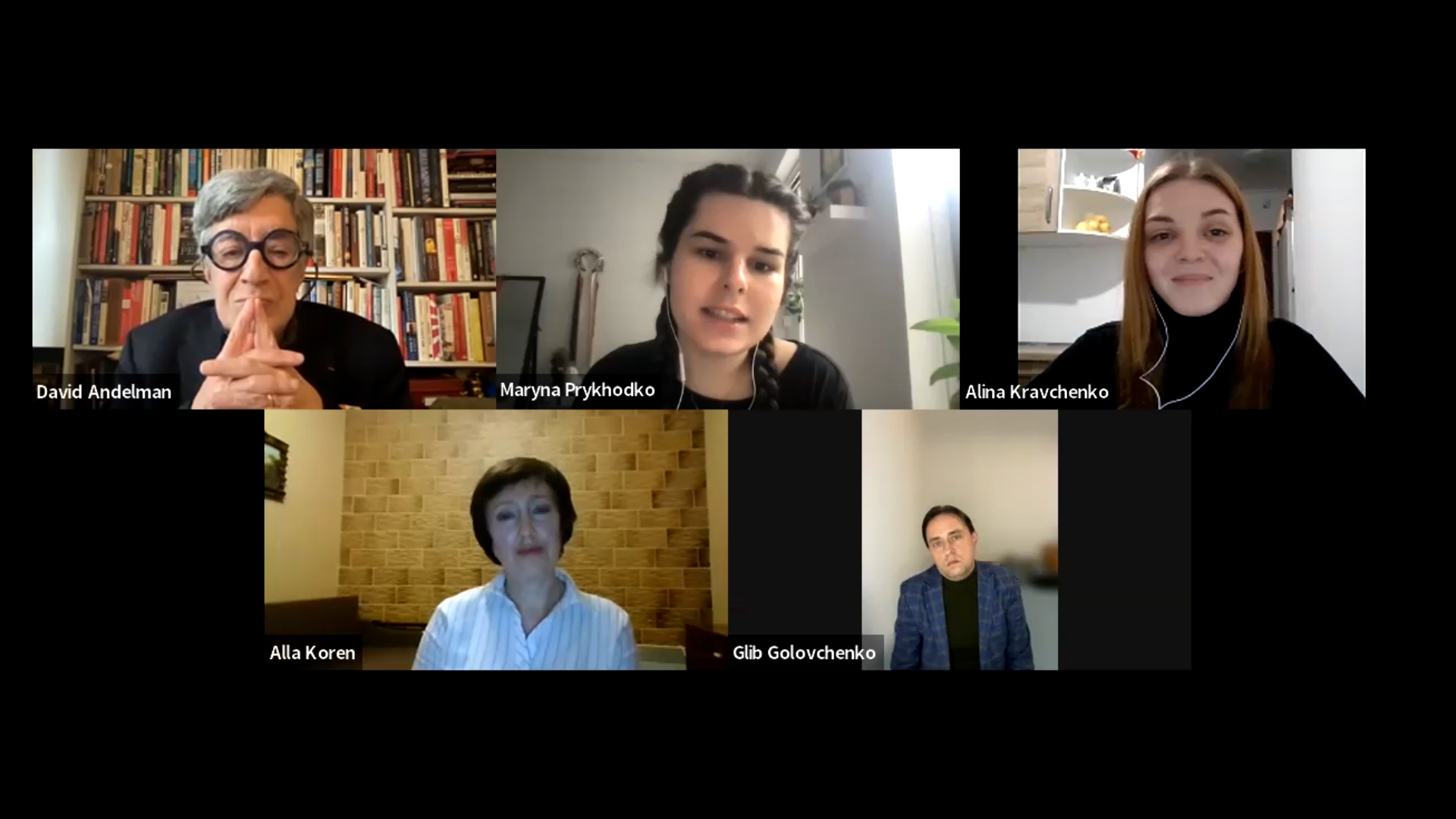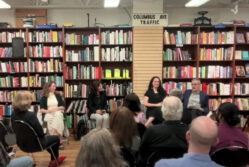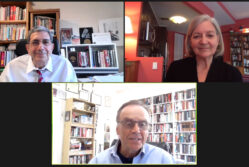Archive Event Highlight

‘In the Thick of It’: Ukrainian Journalists Reflect on a Year of Struggle

Clockwise from upper left: David A. Andelman, Maryna Prykhodko, Alina Kravchenko, Glib Golovchenko and Alla Koren.
Click here to make a donation to support the OPC’s ongoing efforts to help journalists covering the war in Ukraine.
by Chad Bouchard
A common plea for international media emerged from three Ukrainian journalists during an OPC program on Feb. 22: please don’t forget this war. The program, part of the club’s “In the Thick of It” series, convened three recipients of last year’s 18 OPC grants for Ukrainian journalists struggling to continue their work under dire conditions.
“As soon as foreign journalists stop covering the events in Ukraine, the international audience will also lose its interest and lose its understanding of what’s going on in Ukraine,” said Alina Kravchenko, who works remotely for the National Union of Journalists of Ukraine on a project focused on Ukrainian journalists.
Comments from all three panelists were in Ukrainian with translated summaries from Maryna Prykhodko, a Ukrainian activist and volunteer based in New York who serves on the Executive/Leadership team of the non-profit organization Razom for Ukraine. Quotes from this event recap are from Prykhodko’s translations.
The moderator was David A. Andelman, a past president of the OPC, author, columnist for CNN Opinion and creator of SubStack’s Andelman Unleashed.
He opened the program by asking the group to talk about challenges each has faced since the Russian invasion on Feb. 24 last year.
Alla Koren, the editor of the local newspaper “Time. People. Events” in the town of Sarata in the Odesa region said despite some warning signs before the invasion, reporters were not expecting the scale of Russian attacks.
“It’s true we were lost, but not for long. Only two editions of the paper didn’t come out. We quickly came together to make sure the newspaper did come out as soon as possible in March,” she said. Koren, who has worked at the paper for almost 40 years, said the staff quickly decided that the news operation was crucial for informing Ukrainians about the war, and, “found a new sense of motivation and inspiration” about their work.
She added that her paper was facing closure at the beginning of the invasion due to advertiser and subscription funding suddenly drying up.
“But then, unexpectedly, help came in the form of the grant from the OPC,” she said. Koren said the grant covered newspaper subscriptions for 308 readers, giving them the ability to maintain access to information and remain connected to the world. “It was not only about money. It was about moral support. The newspaper and the community could think about the future with optimism, now, knowing that this support existed.”
Kravchenko was working for Donbas Online, a regional TV and radio company in the Lukhansk region of eastern Ukraine, when the war started. To flee heavy shelling at the end of March, she evacuated to Ivano-Frankivsk in western Ukraine and then to Lviv.
“Unfortunately, at that time there was no safe territory within Ukraine,” she said. With her employer now offline, she decided to work alone as a freelance journalist. “There were too many obstacles, even for teams of journalists that were working in ‘more safe’ territories.”
Kravchenko noted that the laptop she was calling in from was purchased using the OPC grant money, because she had to leave all of her equipment behind when she fled.
Glib Golovchenko, chairman of the Mykolaiv Press Club and president of the All-Ukrainian Association of Press Clubs, said that even a year later, he still finds it difficult to revisit memories of the first days of the invasion. He was in the Mykolaiv region of southern Ukraine at the time, which was bombarded and attacked, and he and his colleagues “found themselves on the front lines overnight, in a matter of moments.”
“It wasn’t just media that we were fighting for on the front line, but also for democracy and for the future of our country.”
Golovchenko is now working to provide humanitarian aid to journalists and others in Mykolaiv and producing a video series called “War Heroes of the Mykolaiv Region.”
He said in the weeks following the invasion, many media company owners fled the country, leaving behind a vacuum in coverage that press clubs in Ukraine and Poland tried to address with alternatives. They soon realized that about 20 percent of Ukrainian media had been commandeered by Russian forces to bolster the invasion and spread misinformation internationally.
“It’s thanks to world media in this critical moment that there was a lot of attention to what was actually going on in Ukraine,” he said.
Koren said one of the biggest challenges she and colleagues have faced is Russian misinformation broadcasting over satellite television, which local residents have access to. “It sows doubt in Ukrainian media. This is how the Russian narratives are spread.”
“What really need to happen is Ukrainian media needs to keep doing its job, so that there Ukrainian narratives and the truth continues to exist, and people can turn to it when they’re ready.”
Kravchenko said a lot has been done in the Ukrainian media sphere to combat Russian narratives and influence. Her work focuses on ensuring people in frontline and occupied territories have access to Ukrainian media, so that they “continue to have information about recent developments and events, and that they also know they are not alone, that Ukraine has not left them,” she said.
“Once Ukrainian media is not accessible, people will start to think that Ukraine has given up on them, but this is not the case.”



